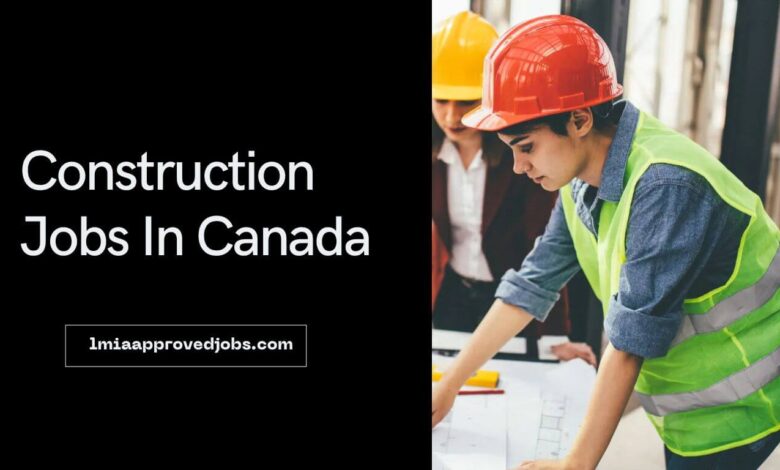Construction Jobs In Canada 2025 – Visa Sponsorship

The construction industry in Canada is experiencing robust growth due to significant infrastructure development, urbanization, and housing projects. This surge in demand has resulted in a considerable need for skilled workers across various construction trades.
To address labor shortages, many Canadian construction companies are offering visa sponsorship opportunities to qualified international workers.
Check Also: Supermarket Cashier Jobs in Canada – Visa Sponsorship
This article provides a comprehensive overview of the construction positions available in Canada, including the responsibilities associated with each role, the eligibility criteria for foreign workers, and the steps to secure a job with visa sponsorship.
Why Construction Jobs in Canada Are in High Demand?
The construction sector in Canada is essential for the country’s economic development, contributing to the creation of residential homes, commercial buildings, and crucial infrastructure such as roads, bridges, and public buildings. This demand for construction services is accelerating, creating employment opportunities in various provinces, including Ontario, Alberta, and British Columbia.
As Canada’s construction industry continues to expand, both skilled tradespeople and general laborers are sought after to fill gaps left by a shortage of domestic workers. This has led to Canadian employers offering visa sponsorship to international workers, providing foreign laborers with exciting career prospects and opportunities for permanent residency.
Roles:
The Canadian construction sector is vast, offering a wide range of job opportunities. Below are some of the most common positions available in the industry:
- Carpenters
Carpenters in Canada are responsible for building frameworks and installing structures such as walls, roofs, and other interior elements. They also read blueprints and adhere to building codes and safety regulations. - Electricians
Electricians handle the installation, repair, and maintenance of electrical systems in both residential and commercial buildings. Their work ensures that the electrical wiring and systems meet the required safety standards. - Plumbers
Plumbers install and repair plumbing systems, including water supply lines, waste disposal systems, and fixtures in buildings. Their work is crucial to maintaining functional and efficient water systems in homes and businesses. - Heavy Equipment Operators
These professionals operate construction machinery such as cranes, bulldozers, and excavators to move materials and earth at construction sites, contributing significantly to the efficiency and progress of construction projects. - General Laborers
General laborers play a vital role on construction sites, assisting with tasks such as site preparation, loading and unloading materials, and maintaining a clean and organized work environment. - Project Managers and Supervisors
Project managers oversee construction projects from start to finish, ensuring that they are completed on time, within budget, and according to specifications. Site supervisors are responsible for coordinating and overseeing the day-to-day activities of workers. - Welders
Welders are essential for joining metals and other materials in construction projects. They work on large-scale structures, including bridges and industrial projects, ensuring that all metalwork is properly secured and up to code.
Benefits:
- High Demand and Job Security
With ongoing infrastructure projects and private sector construction, the demand for construction workers in Canada remains high, offering workers job security and stability. This is especially true in urban centers like Toronto, Vancouver, Calgary, and Ottawa. - Competitive Salaries and Benefits
Construction workers in Canada can expect competitive pay, which increases with experience, specialization, and certification. In addition to salaries, employers typically offer comprehensive benefits, including health insurance, retirement plans, and paid vacation. - Career Advancement Opportunities
Construction workers in Canada have access to various career advancement opportunities. For instance, starting as a general laborer can lead to specialized roles in carpentry, plumbing, electrical work, or even supervisory and project management positions. With proper training and certifications, workers can further advance in their careers. - Pathway to Permanent Residency
The Canadian government actively recruits foreign workers to fill the labor shortages in construction. Many construction jobs are listed under Canada’s in-demand occupations, which means foreign workers may be eligible for permanent residency through programs such as the Temporary Foreign Worker Program (TFWP) or the Federal Skilled Trades Class (FSTC) within the Express Entry system. - Diverse Work Environment
The Canadian construction industry is known for its inclusive environment, with workers from a variety of backgrounds coming together to work on diverse and large-scale projects, including public infrastructure, commercial buildings, and residential developments. - Skill Development and Training
The Canadian construction industry promotes continuous learning, offering training programs, apprenticeships, and certifications. These programs provide workers with valuable hands-on experience and the skills necessary to progress in their careers. - Work-Life Balance
Many construction companies in Canada offer structured work schedules and seasonal work options, allowing workers to balance their professional and personal lives. Some roles are project-based, which allows workers to take time off between projects, ensuring flexibility and work-life balance. - Access to Modern Technology
Canada’s construction industry integrates advanced technologies such as drones, robotics, and Building Information Modeling (BIM) to enhance project efficiency, safety, and accuracy. Workers gain proficiency in these technologies, which ensures that their skills remain up-to-date and in demand. - Visible Job Impact
Construction workers often experience a strong sense of job satisfaction, as their efforts contribute directly to the construction of vital infrastructure and buildings that remain for years to come. - Stringent Safety Standards
Safety is a top priority on Canadian construction sites. The Canadian Centre for Occupational Health and Safety (CCOHS) establishes strict safety standards and regulations to ensure workers have the necessary training and equipment to work safely and mitigate risks.
Responsibilities:
Although job duties vary depending on the position, certain responsibilities are shared across many construction jobs:
- Reading and Interpreting Blueprints: Understanding construction plans and technical drawings is essential for many roles.
- Operating Heavy Machinery: Many positions require workers to operate cranes, excavators, forklifts, and other construction equipment.
- Adhering to Safety Protocols: Ensuring that safety regulations are followed to prevent accidents and injuries on-site.
- Team Collaboration: Working closely with other professionals, including supervisors, laborers, and craftsmen, to complete projects on time.
- Handling Materials: Transporting and securing construction materials to ensure proper use and safety on-site.
- Ensuring Quality Control: Ensuring that all work meets the specifications outlined in the project plan and complies with industry standards.
- Site Maintenance: Keeping the worksite organized and free from hazards to maintain a safe working environment.
Qualifications and Skills:
International workers must meet specific qualifications to work in Canada’s construction sector, especially if applying for positions with visa sponsorship:
- Relevant Experience
Employers prefer candidates with prior experience in construction roles. For skilled trades, a minimum of 2–3 years of experience is often required. - Educational Background
General labor positions generally require a high school diploma or equivalent. Skilled trades may require vocational training, apprenticeships, or certification. - Trade Certification
Certain skilled trades, such as plumbing and carpentry, require Red Seal certification. This certification allows workers to practice their trade across Canada without needing to re-certify in each province. - Physical Fitness
Construction work is physically demanding, so candidates must be in good health and capable of performing strenuous tasks. - Language Proficiency
Workers must be proficient in either English or French, depending on the region, to understand safety instructions and communicate effectively on construction sites. - Work Permit Eligibility
International workers must meet the Canadian immigration requirements, including possessing a valid passport, proof of qualifications, and work experience, in order to apply for a work permit.
Employers Offering Construction Jobs with Visa Sponsorship:
Several Canadian construction companies are actively recruiting international workers and offering visa sponsorship. Here are some of the top employers:
- PCL Construction: A major construction firm with diverse projects across Canada, regularly hiring international talent.
Career Portal - EllisDon: One of the largest construction companies in Canada, offering competitive compensation packages and visa sponsorship for skilled trades.
Career Portal - Ledcor: Specializing in civil, energy, and infrastructure projects, Ledcor frequently recruits international workers.
Career Portal - Aecon Group: Focused on large-scale infrastructure projects, Aecon regularly seeks foreign workers for its construction teams.
Career Portal - Bird Construction: A leader in civil, industrial, and building construction, offering jobs for international workers with visa sponsorship.
Career Portal
How to Apply for Construction Jobs In Canada 2025?
Follow these steps to apply for construction jobs in Canada:
- Research Job Openings: Explore company career portals to find positions that offer visa sponsorship for international workers.
- Tailor Your Resume: Customize your resume to highlight relevant experience, certifications, and training specific to the position.
- Submit Your Application: Apply directly through the company’s job portal and submit a cover letter that emphasizes your suitability for the role.
- Visa Sponsorship Process: Employers must obtain a Labour Market Impact Assessment (LMIA) to prove the need for foreign workers. Once the LMIA is approved, you can apply for a work permit.
- Work Permit Application: After receiving a job offer, submit a work permit application to Immigration, Refugees, and Citizenship Canada (IRCC).
- Transition to Permanent Residency: After gaining sufficient work experience, foreign workers may apply for permanent residency through programs like the Canadian Experience Class (CEC).
Frequently Asked Questions:
-
Are construction jobs in demand in Canada?
Yes, the construction industry in Canada is facing labor shortages, especially in skilled trades, due to ongoing development projects.
-
How much do construction jobs pay in Canada?
The average salary for construction workers is around $43,992 per year, with entry-level positions starting at approximately $39,000 annually and experienced workers earning up to $57,562.
-
How do I get a construction job in Canada?
Applying for apprenticeship programs or directly applying for skilled trade positions with companies offering visa sponsorship is a good starting point.



